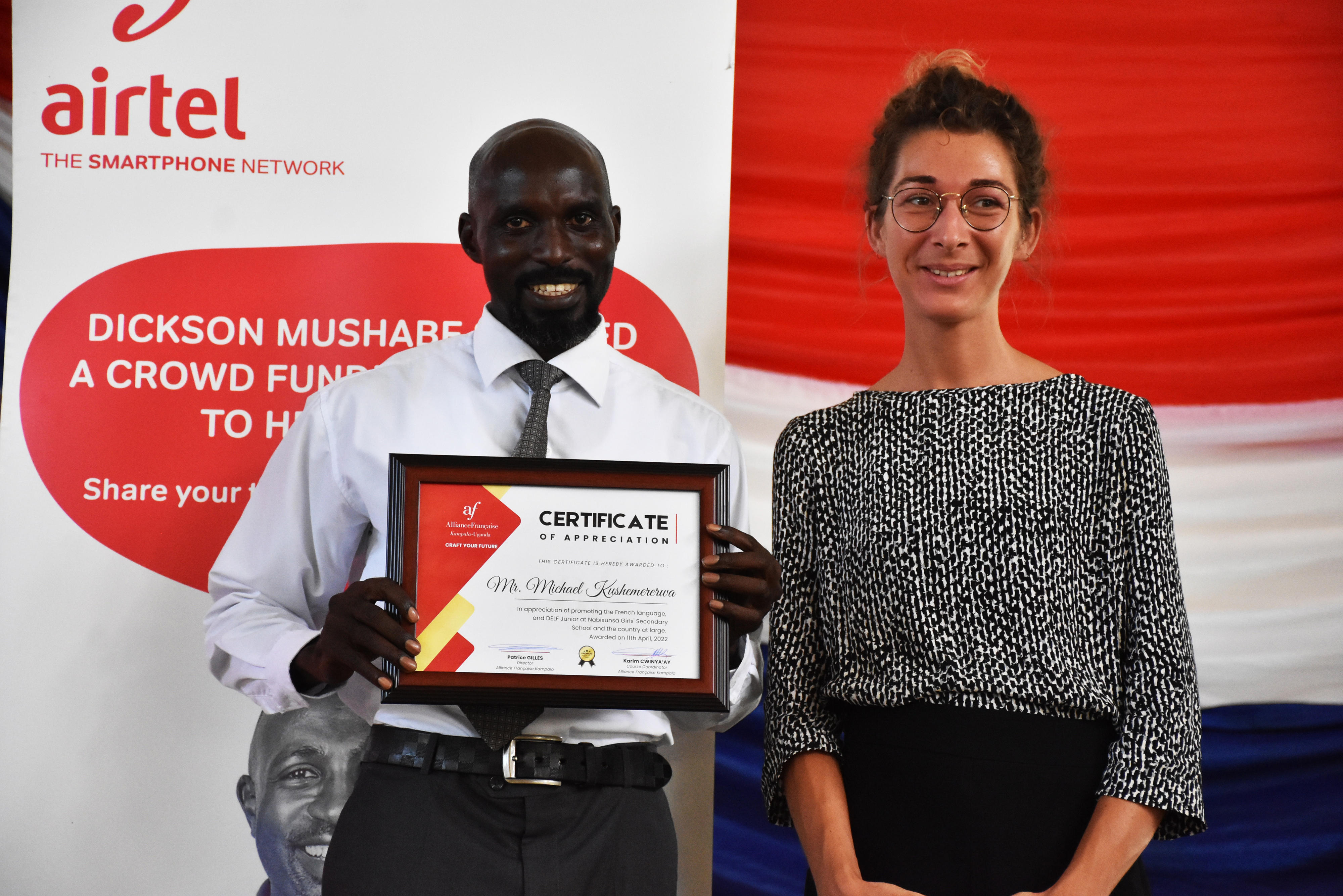Why you need to take that language proficiency test

Some UPDF officers display their French language certificates with the ambassador of France to Uganda. PHOTO | PROMISE TWINAMUKYE
What you need to know:
- Professionals, especially in the medical field, are required to attempt the IELTS in order to acquire a job in countries such as the UK, US or Australia where medics, especially nurses, are in short supply. Without this test, such professionals may not get posted for a job.
Many people wish to pursue certain courses, immerse in new culture and language but miss out on scholarship and better work opportunities because they lack language skills.
Lois Nakibuuka, an instructor at Andlo Smart Options, says International English Language Testing (IELTS) and Test of English as a Foreign Language (TOEFL) are English proficiency tests which test your ability to use the language in various ways and contexts.
Australia, USA, UK, Germany and Canada are the commonest countries with this requirement. When you are going to study abroad for instance, you need to choose a programme depending on your interest.
“Different universities have different application processes and requirements that are stated on their websites. For non-native English speakers wanting to study in Anglophone countries, you will need proof of your English language proficiency by sitting the test,” she says.
The former British Council examiner, remarks that the tests help one to prove that you can speak and write the language to a fairly high level to ensure that you will be able to follow your course without comprehension difficulties since it is the language of instruction.
“In a language proficiency test, the examiner is testing your reading, listening, writing and speaking level so that you are not left behind while attending lectures,” Nakibuuka says.
IELTS and TOEFL achieve the same purpose so you only need to attempt one and certificates are valid for two years.
Meanwhile, Karim Cwinya’ay, course coordinator at Alliance Francaise Kampala(AFK), says AFK is the only centre in Uganda that is accredited to test one’s French proficiency. The test include Test de Connaissance du français (TCF) is for anyone who wishes to initiate the process for permanent economic immigration or Canadian or France citizenship while TEF is for candidates wishing to assess their level of proficiency in French for immigration to Canada, or Canadian or France citizenship applications.
There are six levels of French; if one is going to a Francophone country, they must be an intermediate (B1 to B2) or advanced (C1 to C2) level.
Also, Chinese is only examinable at Confucius Institute at Makerere in Uganda. Chris Mukama, a Chinese tutor, says the Hanyu Shuiping Kaoshi (HSK) test is an official test of Chinese language proficiency for non-native speakers that tests the written competency and how you use the different characters. To travel to China HSK is not a prerequisite because many people there speak English but if your course is in Chinese, you ought to comply. Since Chinese is a tonal language with hesitations, the HSK tests spoken Chinese where you are required to talk about a given topic.
“There are six levels of the HSK and you need to be at HSK5 if you have a scholarship in Chinese for easy communication but, this usually expires after two years if you are going to China. You therefore, have to re-sit another updated one after this time. If you are going to another country, the HSK does not expire,” Mukama says.
Nakibuuka warns that, “For English, you need to be sure which of the tests required depending on your destination to avoid wasting money on a non-preferred test.”
Why need the exams?
To get accepted in many universities or colleges across the world, Nakibuuka says, “You will need these test results to prove your level of English. And, even if you studied in countries where English is the official language of instruction, a large number of universities still requires you to present your IELTS results.”
Additionally, for your scholarship application to be considered favourably, most scholarships almost always require this test.
Professionals, especially in the medical field, are required to attempt the IELTS in order to acquire a job in countries such as the UK, US or Australia where medics, especially nurses, are in short supply. Without this test, such professionals may not get posted for a job.
How is it done?
The IELTS is conducted at a venue chosen by the British Council in Uganda. Although it can be done either on paper or on computer there is no difference in the way it is assessed. The only difference is the period in which you can access your results; 10 days for the computer-based and 14 days for the paper - based test. The average minimum band score is 6.5.
The TOEFL on the other hand is conducted online but at a test designated venue. The results are available after six days and the average pass score is 120.
Nakibuuka remarks that preparation for the test is vital. The three-week training course involves equipping you with the precise skills and practice needed to ace the test.
“Because they are tests, one needs prior thorough preparation. Your grammar and other skills such as analysis, intensive reading, and understanding hidden meanings are tested. Without prior preparation, chances of performing well are low,” she notes.
Katumwa did the test and did not score the desired results but on second attempt, his score was; 8.0 in listening, 7.5 in reading, 6.5 in writing and 8.0 in speaking making an overall band score of 7.5— which was desired.
“It is important to take the exam seriously. Have enough time to read and prepare for it, says Katumwa, adding: “You need about a month to exhaustively prepare for all the parts of the exam. You need to take time out and do as many practice exercises on your own. This enables you to identify your weaknesses and work on them. When you fail, stay positive and focused until you get the desired results.”
The case of Uganda
There are international students whose language of instruction in their home countries is not English that come to study here. Daniel Wasike, the academic registrar Uganda Institute of Business and Media Studies (UIBMS), says such people enroll for short courses for English proficiency.
“Some international students who are not fluent in English enroll for a short course in the language and they are able to speak, listen and write it with proper grammar in a month’s time. This helps when they are pursuing their studies and daily interactions,” Wasike says.
Hamza Ssegawa, the academic registrar at Kampala University, says the international students undertake the special test of English when they arrive at the university.
“They are taken through an English check and those who are found lacking incur a cost separate from the university tuition fees to attend English classes and we assess how fluent they are before they start their courses,” he remarks.




